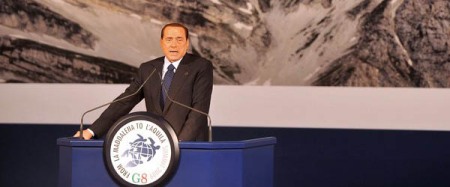
Andrew F. Cooper
Associate Director and Distinguished Fellow, CIGI
The G8 Summit at L’Aquila is a study in contradictions. The Italian presidency’s approach remains a languid one amidst an intense global recession. Here, style trumps substance. The site of the summit – re-located at the last moment in sympathy with the victims of the devastating earthquake is still a work in progress. The host government from the start lacked any overarching vision for the Summit. The brand trotted out in the last few weeks, that L’Aquila represented a “summit of principles”, crumbled quickly amidst its inconsistency with the scandals associated with Prime Minister Silvio Berlusconi.
The United States tried to rescue the G8 by taking on some elements of leadership. Key sherpa meeting were called and shaped by American officials. A big delivery has been promised in the form of a major initiative on food security. Yet, these moves can not mask the reality that the US has already moved on from prioritizing L’Aquila to focus its attention on the Pittsburgh G20 on September 24-25. L’Aquila has become a minor whistle stop in a crowded tour, in which the instrumentalism of the re-setting US-Russian relations is mixed with the symbolism of Obama’s private audience with the Pope and his emotive trip to Ghana as the first African-American president.
Yet just as the meeting of leaders cannot escape the local predicament of the L’Aquila populace, the global crisis and possible alternative solutions to them continues to stare them in the face. No longer is the G8 a small intimate gathering where declarations are made by a small group of leaders operating on an exclusive basis. The G8 has become a place where a range of cameo appearances are made by leaders from all regions of the world. Only on the first day, with a relaxed mid-day start, does the G8 meet by itself. And even the notion of the G8 as a ‘likeminded’ group of representative democracies is complicated by the presence of Russia. This puts serious obstacles in the way of a firm resolution sanctioning Iran, to give just the most obvious illustration.
Without a sense of urgency or a fixed menu about what and how the world economic crisis should be handled, Italy has presented a buffet spread of countries and leaders around the table. The second day sees two important meetings with wider constellations of countries. In the morning, a meeting takes place between the G8 with the so-called G5 of big emerging states. In the afternoon, a meeting of the Major Economies Forum on climate and energy will be convened jointly by Berlusconi and Obama. Opening up the forum even further on the third day, a constellation of African countries have been welcomed to L’Aquila to talk aid and food.
In terms of legitimacy, such variable geometry looks attractive, in that it can be considered a response to the criticism that the G8 is an unelected club. However, the basic reality of world politics is that the loss of exclusivity signals erosion not a firming up of efficiency. Facilitated by the laxness by the Italian hosts, the G8 as a club is eroding as the hub of global governance. There is no going back to the cozy comforts of its origins in the mid-1970s. But it cannot find traction either in being a mock version of a universalistic body.
From this perspective, it is tempting to simply see the gravity of power (and status of club membership) moving from the G8 to the G20. As Chancellor Angela Merkel pronounced in her speech to the Bundestag last week, the G8 may remain a role as a discussion group, but decision-making will shift to the G20.
As I will comment tomorrow, the details such a shift though must still be nuanced. If building momentum such a shift is full of complexity that need full discussion. Can what is in effect a crisis committee become institutionalized as the new top club? At the same time, the club will continue to have factions that both cooperate and compete. Can the older G8 members – in effect the G7 plus the EU Commission – bounce back from the signs of its depleted status to recompose itself as an effective caucus, moving past both internal stylistic and substantive differences (as illustrated most dramatic models of regulations versus stimulus).
And just as crucially can some order be provided in our characterizations of the new rising cluster, beyond simply the G20 minus the G8? Is this cluster a loose array of states, as diverse as Turkey, Australia and Indonesia? Or is there a core group from within? This will be the focus of another posting on the last day of the L’Aquila Summit.
Disclaimer: This blog is solely intended to spur discussion, while the opinions expressed are those of the author(s) and do not necessarily reflect the views of CIGI, Chatham House or their respective Boards of Directors.
We invite you to the Open G8 Conference!
Global Opinion
3 Days of Global politics for Everyone
8-th July to 10-th July 2009
http://www.global-opinion.org
The Online G8 Summit is not just a summit for the Leaders in L’Aquila, but an open Podium where everyone has a chance to speak up. How can we form a better World, from this age of Globalization? Let your Political Representative speak your mind. Every Message will become a component of a Book, which will document the democratic decision-making of the free world. At the end of the virtual Summit, the book will be given to the G8 Leaders in printed form.
Please participate in 3 days of worldwide public decision-making:
http://www.global-opinion.org
Global Opinion is a project by Studio Bauhaus (Bauhaus University Weimar) in collaboration with the Institute of Media Technology (Technical University of Ilmenau)